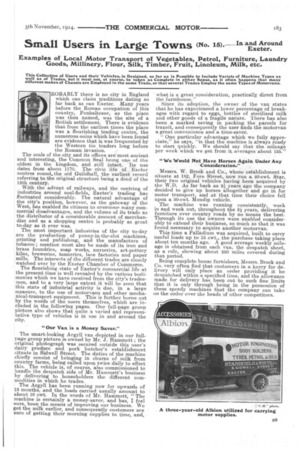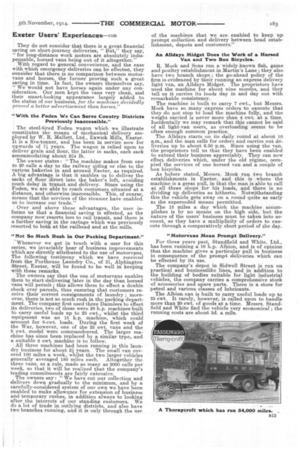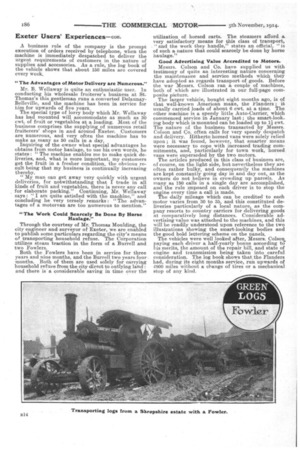Small Users in Large Towns (No. 15).—In and Around
Page 15

Page 17

Page 18

If you've noticed an error in this article please click here to report it so we can fix it.
Exeter.
Examples of Local Motor Transport of Vegetables, Petrol, Furniture, Laundry Goods, Millinery, Flour, Silk, Timber, Fruit, Linoleum, Milk, etc.
This Collection of Users and their Vehicles, is Designed, so far as is Possible to Include Variety of Machine Types as well as of Trades, but it must not, of course, be taken as Complete in either Sense, as it often happens that many different makes of Chassis are Employed in the same Trade, or that several Trades Employ the same Types of Motorvans.
ROBABLY there is no city in England which can claim traditions dating so far back as can Exeter. Many years before the Roman occupation of this country, Penhaltcaer, as the place was then. named, was the site of a British settlement. There is evidence that from the earliest times the place was a flourishing trading centre, the numerous coins which have been found are evidence that it was frequented by the Western tin traders long before the Roman invasion.
The seals of the city and its offices are most ancient and interesting, the Common Seal being one of the oldest in the kingdom, and still intact. Its use dates from about 1170. The civic life of Exeter centres round, the old Guildhall, the earliest record referring to the original structure being a deed of the 12th century.
With the advent of railways, and the centring of industries around coal-fields Exeter's trading has fluctuated considerably. The natural advantage of the city's position, however, as the gateway of the West, has enabled its citizens to overcome many commercial disadvantages, and the volume of its trade as the distributor of a considerable amount of merchandise and as a shopping centre is probably as great to-day as it ever was.
The most important industries of the city to-day are the production of penny-in-the-slot machines, printing and publishing, and the manufacture of tobacco ; mention must also be made of its iron and brass foundries, soap works, nurseries, art-pottery kilns, breweries, tanneries, lace factories and paper mills. The interests of the different trades are closely watched over by the Exeter Chamber of Commerce. The flourishing state of Exeter's commercial life at the present time is well revealed by the various testimonies which we have received from the city's tradesmen, and to a very large extent it will be seen that this state of industrial activity is due, in a large measure, to the use of motorvans and other mechanical-transport equipment. This is further borne out by the words of the users themselves, which are included in the following pages. Our full-page group picture also shows that quite a varied and representative type of vehicles is in use in and around the city.
'Our Van is a Money Saver."
The smart-looking Argyll van depicted in our fullpage group picture is owned by Mr. J. Hammett ; the original photograph was secured outside this user's dairy produce and pork butcher's establishment situate in Bidwell Street. The duties of the machine chiefly consist of bringing in churns of milk from country farms, being called upon twice daily to effect this. The vehicle is, of course, also commissioned to handle the despatch side of Mr. Hammett's business by delivering to householders the different commodities in which he trades.
The Argyll has been running now for upwards of 18 months, and the loads carried usually amount to about 10 cwt. In the words of Mr. Hammett, " The machine is certainly a, money-saver, and has, I feel sure, been the means of improving our business. We get the milk earlier, and consequently customers are sure of getting their morning supplies to time, and,
what is a great consideration, practically. direct from the farmhouse."
Since its adoption, the owner of the van states that he has experienced a lower percentage of breakages with regard to eggs, bottles of sterilized milk and other goods of a fragile nature. There has also been a marked saving in packing the parcels for transit, and consequently the user hnds the motorvan a great convenience and a time-saver. "One particular advantage which we fully appreciate," he says, "is that the machine is always ready to start quickly. We should say that the mileage per week which we get from it averages about 155."
"We Would Not Have Horses Again Under Any Consideration."
Messrs. W. Brock and Co., whose establishment is situate at 182, Fore Street, now run a 40-owt. Star, their two original vehicles having been acquired by the W.D. As far back as 21years ago the company decided to give up horses altogether and go in for motor transport, and at that time their choice fell upon a 30-cwt. Mendip vehicle.
The machine was running consistently,. week in and week out, throughout the '2i years, delivering furniture over country roads by no means the best. Through its use the owners were enabled considerably to extend their business, so much so that it was found necessary to acquire another motorvan.
This•time a Palladium was acquired, built to carry useful loads up to 15 cwt., the purchase taking place about ten months ago. A good average weekly mileage is obtained from each Van, the despatch sheet, as a rule, showing about 250 miles covered during that period.
Being complete house furnishers, Messrs. Brock and Co. very often find that customers in a hurry for delivery will only place an order providing it be despatched within a specified time, and the allowance made for delivery has been cut to such fine limits that it is only through being in the possession of these speedy machines that the company can take on the order over the heads of ether competitors.
They do not consider that there is a great financial saving on short-journey deliveries, " But," they say, " for long-distance work motors are absolutely indispensable, horsed vans being out of it altogether."
With regard to general convenience, and the ease with which emergency deliveries can be effected, they consider that there is no comparison between motorvans and horses, the former proving such a great saving in time. In fact, the owners themselves say, "We would not have horses again under any consideration. Our men kept the vans very clean, and their smart-looking appearance largely added to the status of our business, for the machines decidedly proved a better advertisement than horses."
"With the rodeo, We Can Serve Country Districts Previously Inaccessible."
The steel-tired Foden wagon which we illustrate constitutes the means of mechanical delivery employed by W. R. Mallett, Ltd., Exwick Mills, Exeter. It is a five-tonner, and has been in service now for upwards of 7-1 years. The wagon is relied upon to deliver grain and flour, the latter in sacks, each sack accommodating about 2.24 lb.
The owner states : "The machine makes from one to 20 calls a day to the railway siding or else to the various bakeries in and around Exeter, as required. A big advantage is that it 'enables us to deliver the sacks of flour direct into the baker's loft, avoiding much delay in transit and delivery. Since using the Foden, we are able to reach customers situated at a distance, and otherwise inaccessible. This, of course, means that the services of the steamer have enabled. us to increase our trade."
Over and above these advantages, the user informs us that a financial saving is effected, as the company now resorts less to rail transit, and there is a further saving in the cartage which was previously resorted to both at the railhead and at the mills.
"Not So Much Rush in Our Packing Department."
'Whenever we get in touch with a user for this series, we invariably hear of business improvements which are directly attributed to the use of motorvans. The following testimony which we have received from the Porthouse Laundry Co., of 31, Alphington Street, Exeter, will be found to be well in keeping with these remarks.
The owners say that the use of inotorvans enables them to start 'delivering later in the day than horsed vans will permit2this allows them to effect a double check over parcels, thus ensuring that customers receive their correct consignments of laundry ; moreover, there is not so much rush in the packing department. The company first used three Daimlers to effect its deliveries, two of these were 28 h.p. machines built to carry useful loads up to 25 cwt., whilst the third equipment was an 18 h.p. machine, which could account for 8-cwt. loads. During the first week of the War, however, one of the 25 cwt. vans and the 8 cwt. model were commandeered. The larger machine has since been replaced by a similar type, and a suitable 8 cwt. machine is to follow.
All three machines had been running in this laundry business for about VI years. The small van covered 100 miles a, week, whilst the two larger vehicles generally averaged 180 miles each. Altogether the three vans, as a rule, made as many as 2000 calls per week, so that it will be realized that the company's trading commitments are fairly extensive.
The owners say : "We have cut our colle3tion and delivery down gradually to the minimum, and by a carefully-considered system of our own we have been enabled to make allowance for extension of business and temporary rushes, in addition always to looking after the interests of our standing customers. We do a lot of trade in outlying districts, and also have two branches running, and it is only through the use of the machines that we are enabled to keep up prompt collection and delivery between head establishment, depots and customers."
An Alldays Midget Does the Work of a Horsed Van and Two Box Bicycles.
R. Mock and Sons run a widely-known fish, game and poultry establishment in Martin's Lane ; they also have two branch shops ; the go-ahead policy of the firm is evidenced by their running an express delivery light van, an Alldays Midget. The proprietors have used the machine for about nine montns, and they tell us it carries its loads day in and day out with remarkable consistency.
The machine is built to carry 7 cwt., but Messrs. Mock have so many express orders to execute that they do not stop to load the machine fully, and the weight carried is never more than 4 cwt. at a time. Incidentally we may remark that this cannot be said of all light-van users, as overloading seems to be often enough common practice.
The Alldays starts on its daily round at about 10 a.m., and the man calls for orders and carries out deliveries up to about 6.30 p.m. Since using the van, the proprietors tell us that they have been enabled to extend their business appreciably. They can now effect deliveries which, under the old regime, occupied the services of one horsed van and a couple of box bicycles.
As before stated, Messrs. Mock run two branch establishments in Exeter, and this is where the machine is a great pull, in that the man is able to call at all three shops for his loads, and there is no dividing up deliveries as hitherto. Notwithstanding this the vehicle gets away on a round quite as early as the superseded means permitted.
The 18 miles a day which the machine accomplishes is by no means on the high side, but the nature of the users' business must be taken into account, as they have a multiplicity of orders to execute through a. comparatively short period of the day.
"Motorvans Mean Prompt Delivery."
For three years past, Standfield and White. Ltd., has been running a 16 h.p. Albion, and is of opinion that the machine gives a particular pull in business in consequence of the prompt deliveries which can be effected by its use.
The company's depot in Sidwell Street is run on practical and businesslike lines, and in addition to the building of bodies suitable for light industrial vehicles, the company carries a comprehensive stock of accessories and spare parts. There is a store for petrol and various classes of lubricants.
The Albion van is built to carry useful loads up to 25 cwt. It rarely, however; is called upon to handle more than 20 cwt. of goods at a time. Messrs. Standfield and White find the vehicle very economical ; the running costs are about 5d. a mile. A business rule of the company is the prompt execution of orders received by telephone, when the machine is immediately despatched to deliver the urgent requirements of customers in the nature of supplies and accessories. As a rule, the log book of the vehicle shows that about 150 miles are covered every week.
"The Advantages of Motor Delivery are Numerous."
Mr. B. Wellaway is quite an enthusiastic user. In conducting his wholesale fruiterers business at St. Thomas's this gentleman runs a converted DelaunayBelleville, and the machine has been in service for him for upwards of five years.
The special type of lorry body which Mr. Wellaway has had mounted will accommodate as much as 30 cwt. of fruit or vegetables at a loading. Most of the business comprises the supplying of numerous retail fruiterers' shops in and around Exeter. Customers are numerous, and very often the machine has to make as many as 50 calls in a day.
Inquiring of the owner what special advantages he obtains from motor haulage, to use his own words, he states : "The machine enables me to make quick deliveries, and, what is more important, my customers get the fruit in a fresher condition, the obvious result being that my business is continually increasing thereby. "My man can get away very quickly with urgent deliveries, for notwithstanding that I trade in all kinds of fruit and vegetables, there is never any call for elaborate packing." Continuing, Mr. Wellaway says : "I am quite satisfied with the machine," and concluding he very tersely remarks : "The advantages of a motorvan are too numerous to mention."
"The Work Could Scarcely Be Done By Horse Haulage."
Through the courtesy of Mr. Thomas Moulding, the city engineer and surveyor of Exeter, we are enabled to publish some particulars regarding the city's means of transporting household refuse. The Corporation utilizes steam traction in the form of a Burrell and two Fowlers.
Both the Fowlers, have been in service for three years and nine months, and the Burrell two years four. months. Both of them are used solely for carrying household refuse from the city direct to outlying land : and there is a considerable saving in time over the
utilization of horsed carts. The steamers afford a very satisfactory means for this class of transport, and the work they handle," states an official, "is of such a nature that could scarcely be done by horse haulage."
Good Advertising Value Accredited to Motors.
Messrs. Colson and Co. have supplied us with testimony of quite an interesting nature concerning the maintenance and service methods which they have adopted as regards transport of goods. Before the war Messrs. Colson ran. a couple of machines, both of which are illustrated in our full-page composite picture.
The larger vehicle, bought eight months ago, is of that well-known American make, the Flanders; it usually carried loads of about 6 cwt. at a time. The ether machine is a speedy little Auto-Carrier, which commenced service in 3-anuary last ; the smart-looking body which is mounted can be loaded up to 1,1 cwt. The nature of the business transacted by Messrs. Colson and co, often calls for very speedy despatch and delivery. Hitherto horsed vans were solely relied upon ; it was found, however, that smarter means were necessary to cope with increased trading commitments, and, particularly for town work, • horsed vans were superseded by the two motors. The articles produced in this class of business are, of course, on the light side, but nevertheless they aka often rather bulky, and consequently the machines are kept constantly going day in and day out, as the owners do not believe in crowding up parcels. As in any as 150 calls in a single day are accomplished, and the rule imposed on each driver is to stop the engine every time a call is made.
The daily mileage which can be credited to each motor varies from 30 to 35, and this constituted deliveries particularly of a local nature, as the company resorts to country carriers for delivering goods at comparatively long distances. Considerable advertising value was attached to the machines, and this will be readily understood upon reference to the two illustrations showing the smart-looking bodies and the good bold lettering scheme on the panels.
The vehicles were well looked. after, Messrs, Colson paying each driver a half-yearly bonus according to* his merits, the amount of the repair bill, and state of engine and transmission being taken into careful consideration. The log book shows that, the Flanders had, during its eight months service, run upwards of 4800 miles without a change of tires or a mechanical stop of any kind.




















